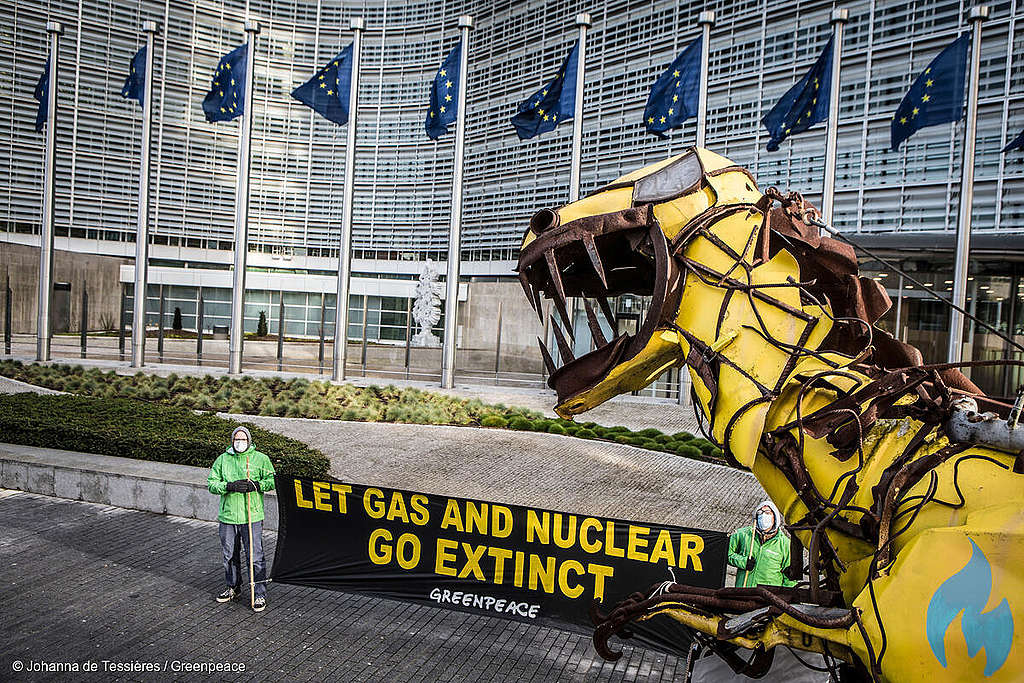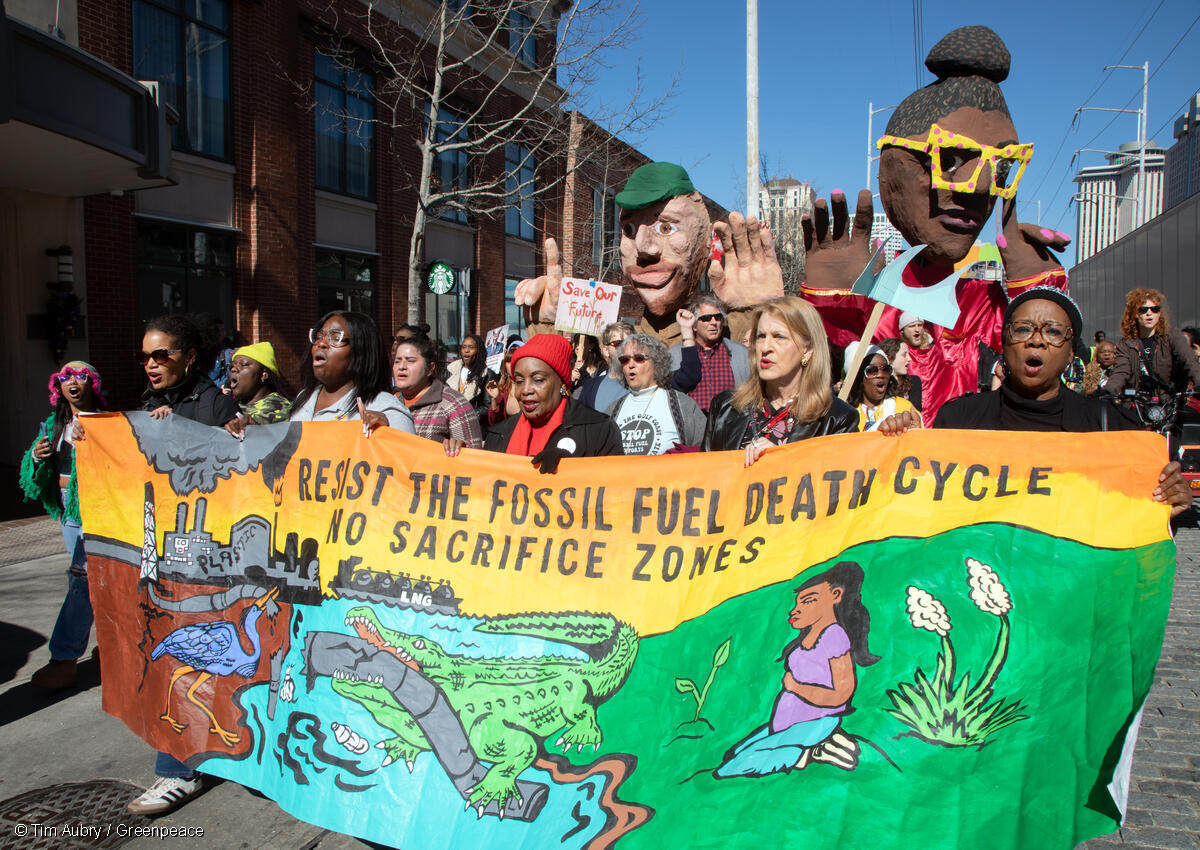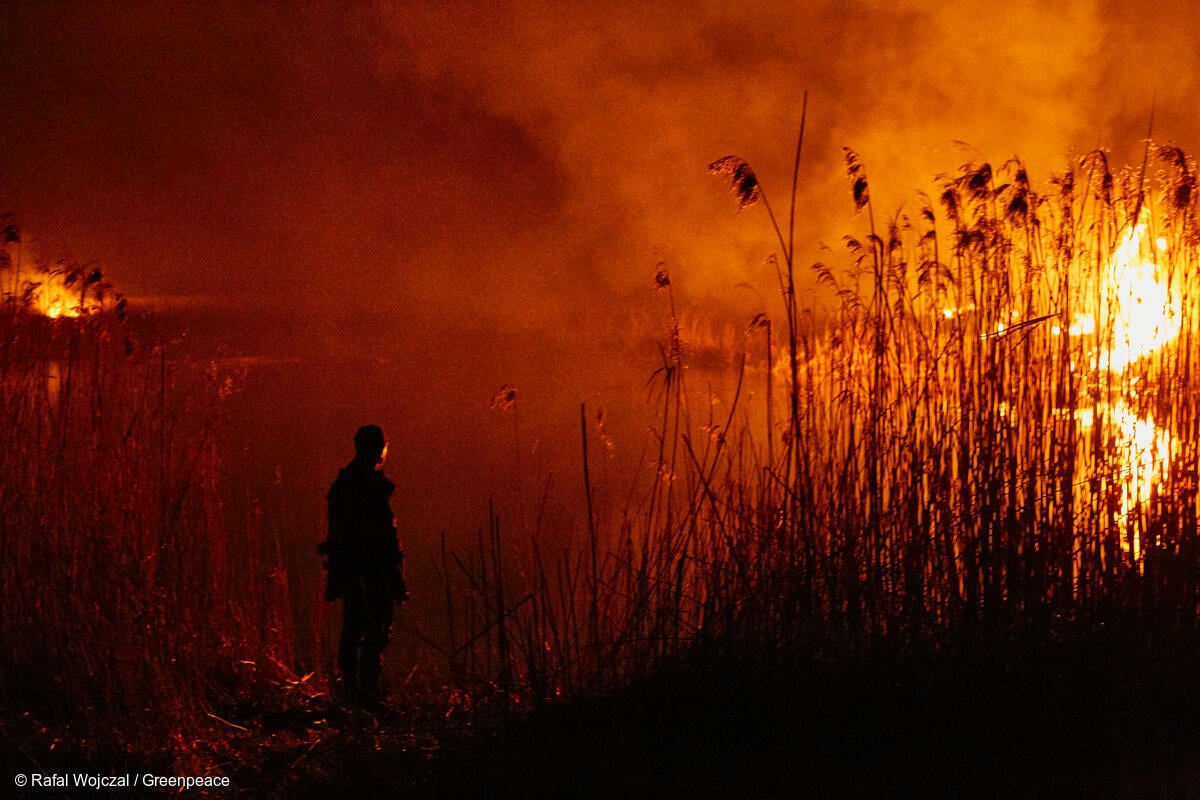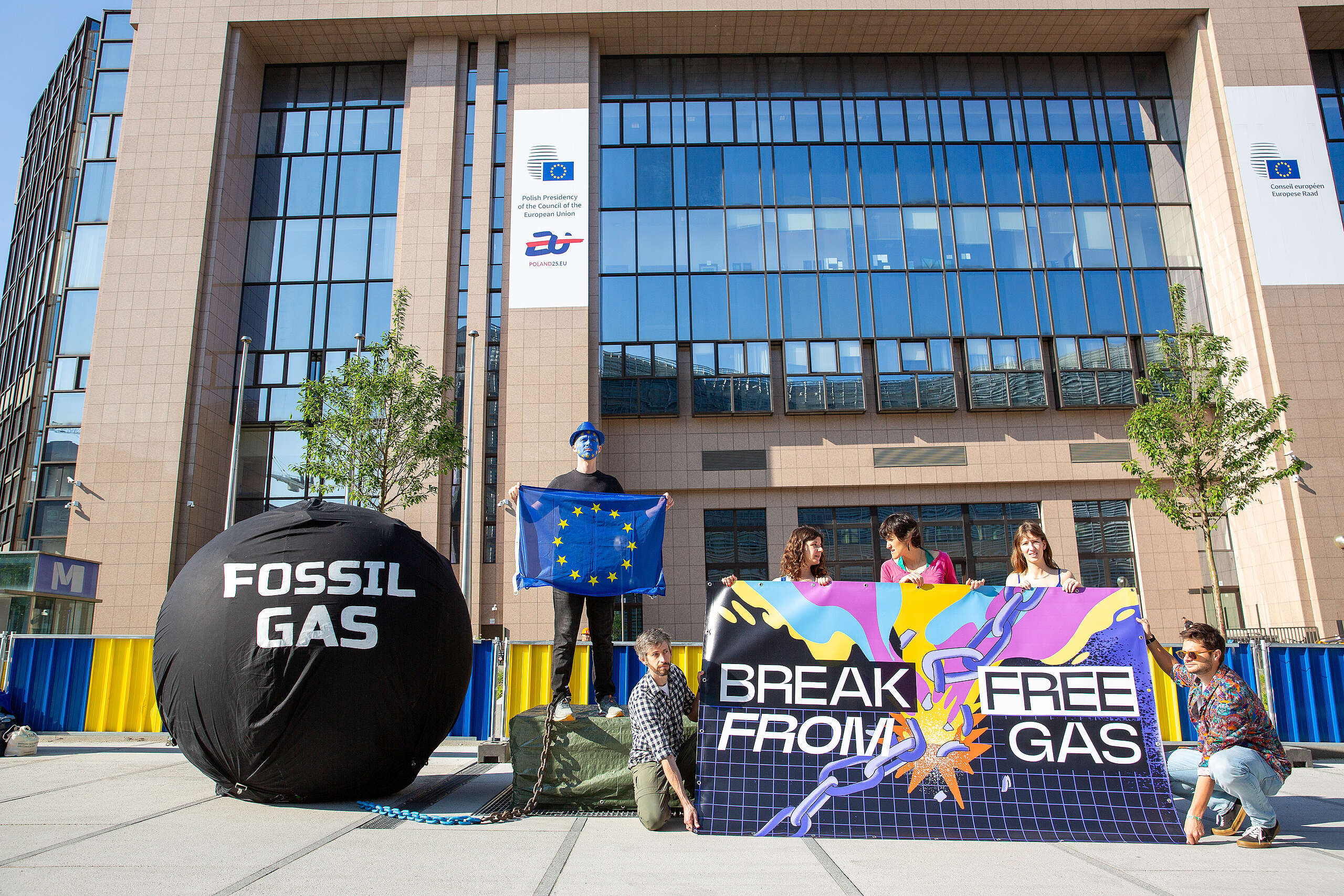Greenpeace European Unit, February 2023
This briefing provides a short outline of Greenpeace’s request for internal review (RIR), sent to the European Commission on 8 September 2022, concerning the Delegated Regulation (EU) 2022/1214 of 9 March 2022 which qualified economic activities in the nuclear energy and in the gas energy sectors as “sustainable” for the purpose of the EU Taxonomy Regulation.

Lawyers Roda Verheyen and John Peters prepared this request upon instruction by Greenpeace Germany and submitted it on behalf of the following Greenpeace organisations: Greenpeace Germany, Greenpeace France, Greenpeace Spain, Greenpeace Italy, Greenpeace Belgium, Greenpeace Luxembourg, Greenpeace Central and Eastern Europe and the Greenpeace European Unit.
The request for internal review highlights a number of shortcomings in the Commission’s assessment of nuclear energy and fossil gas. These shortcomings allowed the Commission to qualify nuclear and gas as “sustainable”. In addition, the request for internal review points out a number of procedural mistakes that the Commission made which also played a role in the adoption of the Delegated Regulation.
Below is a summary of the main arguments laid out in the request for internal review.
Nuclear energy
- Nuclear energy is not a climate change mitigation activity: this is due to the fact that the “plan to operation” time for nuclear power plants is extremely long (in the EU, 10 to 19 years). The long construction time of nuclear plants would delay the phase-out of coal plants. Furthermore, investment in nuclear power plants would hinder the development of renewable energy because electricity grid capacity would be “reserved” for the future nuclear power plant in order to ensure the viability of the investment.
- Nuclear energy is not an “enabling activity”: it does not enable (neither directly nor indirectly) the activities related to the generation, transmission, storage or distribution of renewable energy. On the contrary, nuclear energy hinders the development of renewables. The Commission makes this assumption because it relies on the concept of “baseload”, whereby power from nuclear plants would be necessary to ensure a constant supply of electricity to make up for renewables’ variability. However, a power system based on renewables does not require nuclear baseload capacity. Instead, renewables require a flexible and well interconnected grid, supported by some storage and demand-side measures. Nuclear energy is not flexible enough to coexist with renewables. Due to the impossibility to rapidly adjust nuclear plants’ output to meet changing electricity demands, nuclear baseload leads to the curtailment of renewable power generation in order to keep the system balanced, e.g. on sunny or windy days. Furthermore, due to the exceptionally long periods required for investments in nuclear to become profitable, nuclear energy determines a lock-in effect with a technology that has long-term adverse environmental impacts.
- Nuclear energy is not a climate change adaptation technology: on the contrary, adverse weather events linked to climate change pose a threat to the functioning and safety of nuclear plants and will require substantial technical adaptation measures to ensure that the risks of climate-related failures and accidents are mitigated (for instance, when less water from rivers is available to cool down reactors, due to droughts). However, the Commission failed to indicate which technical requirements nuclear plants would have to meet to deal with these climate-related risks.
- Nuclear energy does not comply with the Do No Significant Harm requirements of the Taxonomy Regulation
- Climate change mitigation: the Commission wrongly estimated the greenhouse gas emissions linked to nuclear energy, because it did not consider the whole life-cycle including mining, milling, transport, operation and decommissioning of uranium. Neither the Joint Research Centre nor the Commission carried out an in-depth analysis on this point. Furthermore, the Commission failed to consider the negative impacts that nuclear energy has on renewables: e.g curtailments, as described above, and the need to reserve capacity to accommodate nuclear power plants, which could be otherwise used for renewables.
- Climate change adaptation: the Commission failed to sufficiently assess the vulnerabilities of nuclear power plants to climate-change-related events, such as floods, wildfires, extremely cold periods and droughts, all of which impair the ability of nuclear plants to be supplied with sufficient cooling water.
- Water and marine resources: the Commission did not define requirements (known as “technical screening criteria”) for the protection of water and marine resources from the impact of nuclear activities. However, nuclear energy can threaten the ecological status of water bodies, both due to the discharge of warm water or the leaching and pollution linked to uranium mining.
- Circular economy: in light of the unresolved issue of nuclear waste, it is incorrect to say that nuclear energy can contribute to a circular economy. The Commission ignored the externalities and waste generated by uranium mining and milling, which produce a large amount of low-level radioactive waste, and can create highly toxic leaching in the mining sites. The Commission has also ignored the problems related to cleaning up uranium mining sites. Likewise, the Commission has underestimated the impacts of the waste deriving from nuclear fuel production and overestimated the possibility of reprocessing and reusing spent fuel. Finally, the Commission has failed to correctly take into account the problems linked to the decommissioning of nuclear plants and to the final disposal of low- and intermediate-level radioactive waste, for which a safe solution, that would rule out intolerable risks for people and the environment over the required time-frame, has not yet been found.
- Pollution prevention: the Commission has not appropriately taken into account the risks of severe nuclear accidents and the related pollution that would derive from those. This is due in particular to the fact that the Joint Research Centre gravely underestimated the risks of accidents and their consequences. Firstly, it wrongly considered that compliance with regulatory measures can be fully effective in preventing severe nuclear accidents; in reality, risks of such accidents will remain even if operators comply with the regulatory framework. Secondly, the Joint Research Centre used direct fatalities as an indicator to assess the impact of severe accidents. This is not the correct measure for risk assessment. The impacts on land and marine ecosystems and their biodiversity, on water bodies as well as on people’s property and activities must also be considered. Besides failing to properly assess the risk of pollution linked to nuclear accidents, the Commission neglected the pollution risks deriving from mining and milling of uranium, as well as from the storage of radioactive waste and spent fuel. Furthermore, the Commission did not pay attention to the pollution caused by the normal operation of nuclear plants and its impact on workers’ health. Finally, the Commission ignored the possibility that a nuclear plant may be subject to terrorist or military attack, and that these events may be the source of major accidents and related pollution.
- Protection and restoration of biodiversity and ecosystems: the request for internal review highlights the detrimental effects that nuclear energy has had and may have on biodiversity. It points to the extensive set studies that exist regarding the case of Chernobyl, which the Commission and the Joint Research Centre did not consider.
Gas
- Gas is not a climate change mitigation activity: the Commission wrongly considered electricity production based on fossil gas to be a climate mitigation activity. The Commission decided that plants emitting up to 270g CO2e/KWh could be included in the EU Taxonomy and did not even require the progressive decrease of the emissions to ensure that the Taxonomy is in line with the EU’s climate commitments and the Paris climate agreement. As the Platform on Sustainable Finance clearly indicated to the Commission, the 100g CO2/kWh limit is the sole “science-based, technology neutral approach” for energy activities, consistent with the previous climate delegated act adopted by the Commission. Therefore, all fossil gas activities exceeding the 100g CO2e/kWh are not within a credible trajectory of emissions reductions to meet the targets of the Paris climate agreement, and are therefore not in compliance with the basic requirements set out in Article 3 of the Taxonomy Regulation.
- Gas is not an indirect climate change mitigation activity: indeed, fossil gas combustion plants would not be “transitional”, as required by the law, because any plant that would be put online today would still run after the deadline for the achievement of the transition (2050), given that the expected lifetime of a plant is 35 years. The Delegated Regulation would make gas plants eligible for the taxonomy even if these would be allowed to burn fossil gas indefinitely, directly contravening the European Climate Law (Regulation (EU) 2021/1119). The Commission also wrongly assumed that there are no “technologically and economically feasible low-carbon alternatives” available. These alternatives do exist in the form of mature, low-cost renewable technologies, and the inclusion of gas in the Taxonomy will hamper their development. The Aurora Report, commissioned by Greenpeace for this legal challenge, shows that the Commission’s decision will give a competitive advantage to gas over renewables and will curtail their development, by reducing the average cost of capital (WACC) for the construction of gas power plants and hence the levelised cost of electricity (LCOE) produced with fossil gas. The inclusion of gas in the Taxonomy will also have the effect of locking the EU energy system into a state of dependence on fossil fuels (so-called “lock-in” effect), as new or retrofitted gas power plants typically operate for about 35 years. This would mean that a plant built now would still be in operation past 2050, when the EU should already be able to rely on a 100% renewable energy system.
Note to editors:
Greenpeace is working with lawyer Roda Verheyen who played a leading role in the successful constitutional complaint against Germany’s 2019 Climate Protection Law, co-initiated by Greenpeace Germany. That case resulted in a German Constitutional Court ruling which found the 2019 Law to be partially unconstitutional and ordered the government to bring the Law into line with the 2015 Paris climate agreement.
Roda Verheyen is available for questions and interviews about Greenpeace’s legal challenge against the addition of gas and nuclear to the EU taxonomy. To schedule an interview please call +49 (0) 171-8780830 or contact [email protected].
Contacts:
Ariadna Rodrigo, Greenpeace EU sustainable finance campaigner: +32 (0)479 99 69 22, [email protected]
Greenpeace EU press desk: +32 (0)2 274 1911, [email protected]
For breaking news and comment on EU affairs: www.twitter.com/GreenpeaceEU
Greenpeace is an independent global campaigning network that acts to change attitudes and behaviour, to protect and conserve the environment and to promote peace. We do not accept donations from governments, the EU, businesses or political parties. Greenpeace has over three million supporters, and 26 independent national and regional organisations with offices in more than 55 countries.
EU Transparency Register: 9832909575-41



